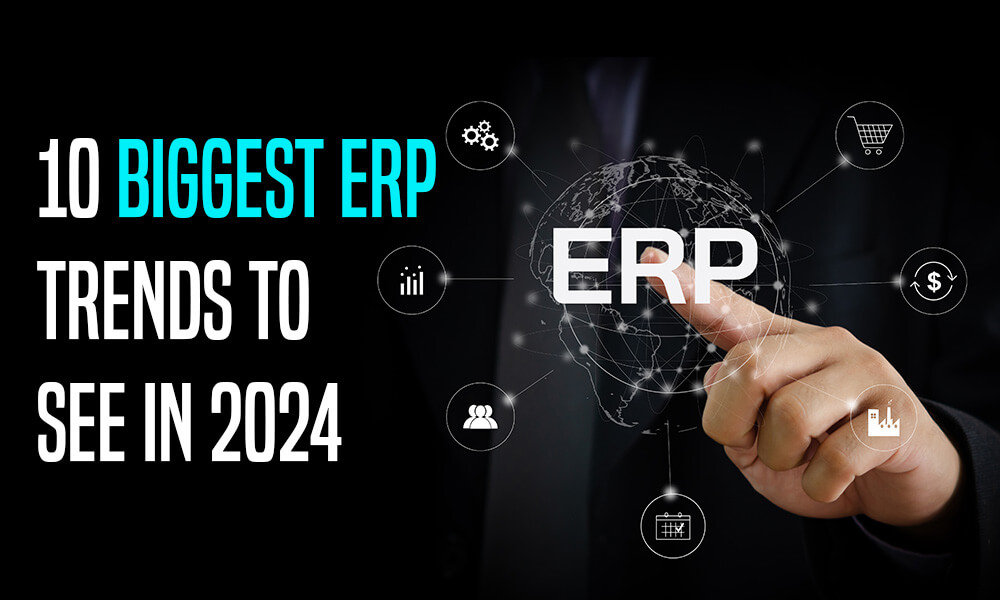All eyes on 2024, please!
With the new year, shift your focus and welcome new ERP trends to simplify your business management.
As we usher in 2024, the ERP industry is expected to undergo significant transformations in ERP solutions driven by technological advancements, changing business needs, and a relentless pursuit of efficiency.
SourcePro continues to be a reliable partner, offering insights into the latest ERP industry trends and software solutions. In this ever-evolving era, businesses that harness the potential of these future trends in ERP systems are poised not only for survival but for sustained success in the competitive landscape.
SourcePro presents a comprehensive guide to the 10 biggest ERP trends that will shape the business ecosystem in 2024.
1. Increased Adoption of Cloud-Based ERP Solutions
Did you know cloud ERP can save your business money? Yes, ERP vendors can increasingly channel their investments into cloud technology, shifting away from traditional on-premise systems.
The allure of cloud models lies in their numerous advantages, particularly the opportunity for smaller companies to complement their IT investments, even when operating with modest in-house tech teams.
With user-friendly applications and versatile cross-platform capabilities, cloud ERP is creating a pathway for these businesses to embrace more sophisticated technologies for a seamless future.
2. Internet of Things (IoT)
While Mobile ERP has a longstanding history, businesses are shifting their perspective on this technology. Capitalizing on the continuous expansion of the Internet of Things (IoT), industry leaders are fostering more interconnected and multi-device experiences.
For instance, organizations are employing IoT-connected devices and sensors to oversee various physical assets, including equipment and products. Consequently, they extract valuable insights into crucial areas such as:
– Employee performance
– System efficiency
– Energy consumption
– User downtime
– Assembly speeds
– Shipping timeframes
Moving on to the next…
3. AI and Machine Learning Integration
The integration of Artificial Intelligence (AI) and Machine Learning (ML) into ERP systems is set to revolutionize data analysis and decision-making. Predictive analytics and automated insights will empower businesses to make smarter, data-driven decisions in real time, enhancing overall efficiency.
4. Popularity of Industry-Specific Solutions
In the contemporary landscape, ERP software providers offer generalized solutions and tailor their offerings to cater to specific industries. This approach enhances efficiency and capabilities, accommodating diverse business types.
Consequently, organizations are actively seeking top-notch ERP functionalities to optimize their operations. These industry-specific solutions are adept at addressing the unique demands of businesses, providing a cost-effective alternative to extensive customization while effectively meeting present business requirements.
5. Blockchain for Enhanced Security
Blockchain technology is making its mark on ERP, providing a decentralized and secure framework for data management. With improved transparency, traceability, and fraud prevention, blockchain integration ensures data integrity across the entire supply chain, reducing the risk of cyber threats.
6. Cloud Dominance
Cloud-based ERP solutions will continue to gain prominence, offering businesses scalability, flexibility, and cost-effectiveness. The cloud enables real-time collaboration, seamless updates, and enhanced security measures, making it an indispensable element of modern ERP strategies.
7. Personalization and User Experience
ERP systems are evolving to prioritize user experience and personalization. Intuitive interfaces, customized dashboards, and AI-driven recommendations will empower users, making ERP systems more user-friendly and ensuring that employees can leverage the software’s full potential.
8. Cybersecurity Prioritization
With the rise in cyber threats, ERP buyers will emphasize cybersecurity even more. Advanced encryption, multi-factor authentication, and continuous monitoring will be integral components of ERP systems to safeguard sensitive business data.
9. Augmented Reality (AR) for Training and Maintenance
Augmented Reality will find applications in ERP for training purposes and equipment maintenance. AR will provide immersive training experiences and facilitate remote assistance, reducing downtime and increasing the efficiency of maintenance operations.
10. Two-Tier ERP
Two-tier ERP, a 2023 trend, enables businesses to simultaneously manage corporate (tier 1) and subsidiary operations. Large enterprises maintain their core ERP software, while smaller units utilize specialized tier 2 solutions. This cost-effective approach offers subsidiaries flexibility to adapt to changing needs. The result is streamlined operations, combining efficiency with tailored solutions.
As we delve into the future of ERP, it becomes evident that staying abreast of ERP trends is paramount for businesses to thrive in the dynamic landscape.
The 10 key ERP trends for 2024 outlined above underscore the industry’s evolution and the transformative power of ERP software.
From the widespread adoption of cloud-based ERP solutions to the strategic emphasis on mobile ERP capabilities, the path ahead is paved with opportunities for ERP expansion.
The future of ERP is shaped by its ability to adapt to changing business needs, and as we navigate the ERP evolution,
SourcePro remains at the forefront, empowering enterprises with the knowledge needed to navigate the complexities and embrace the promising future of ERP.
Would you like to be part of the ERP evolution? Wait no further and get connected to us right away!
